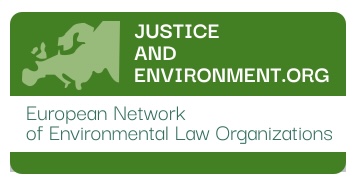Justice and Environment, a member of the Coalition Against SLAPPs in Europe (CASE) is thrilled to announce that the Committee of Ministers adopted the Council of Europe Recommendation on Anti-SLAPP today. This is a huge development with the potential to limit the damage caused by SLAPPs and even deter them. The Recommendation will be a significant tool for environmental defenders within the EU, as it fleshes out the new EU Directive on SLAPPs in important respects, as well as in non-EU member states of the Council of Europe.
Link to the Draft Recommendation
Statement by CASE:
CoE’s Recommendation represents a significant milestone in the fight against SLAPPs CASE welcomes the Council of Europe’s Recommendation on SLAPPs, approved by the Committee of Ministers on Thursday 4 April. The Recommendation is comprehensive and, if genuinely implemented, could significantly limit the damage caused by SLAPPs.
The Recommendation establishes robust and authoritative standards that member states must meet in order to ensure compliance with their human rights obligations. It will prove crucial as European Union member states transpose the new anti-SLAPP directive into national law, and provide a roadmap for non-EU members of the Council of Europe (CoE) to introduce effective anti-SLAPP protections of their own.
The publication of the Recommendation follows a two-year drafting process through the Committee of Experts on Strategic Lawsuits Against Public Participation (MSI-SLP), comprising representatives from Member States and independent experts. CASE has greatly welcomed the transparency and inclusiveness of this process, which included a public consultation on a draft recommendation in July 2023.
EU member states should utilize this Recommendation as well as an important report by the Parliamentary Assembly (PACE) published in January as vital benchmarks when introducing, domestic anti-SLAPP laws. As CASE has already laid out, it is crucial that the EU Directive be understood as establishing minimum standards for anti-SLAPP protection. The Recommendation helps flesh out these standards and provides the detail needed for anti-SLAPP laws to provide meaningful protection.
CASE has closely reviewed the Recommendation and identified important strengths that should serve as a signpost in developing robust anti-SLAPP protections at the national level. At the same time, we have indicated several ambiguities in the text – in particular in relation to the early dismissal mechanism – that could, if interpreted in a restrictive manner, hinder efforts to counter the use of SLAPPs. Member states should clarify and fortify these provisions to ensure the law is comprehensive, leaving no room for exploitable loopholes or circumvention.
CASE will be publishing a full analysis of the Recommendation – along with constructive recommendations of our own as to how its provisions should be transposed into national law in the coming weeks. We will also be publishing our own top-line standards, based on the Recommendation and the PACE report, that member states must meet in order to ensure effective protections against SLAPPs.


